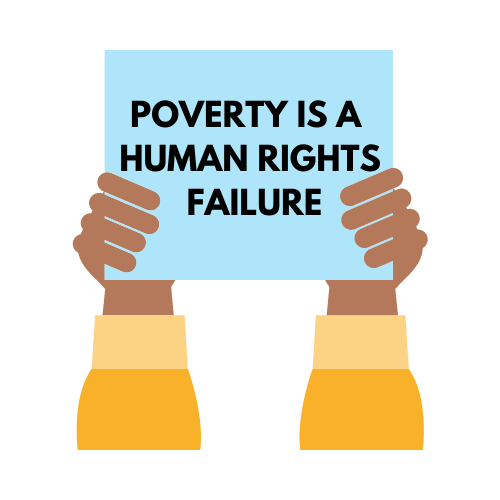At the Poverty Alliance, we have long favoured taking a human rights approach to our anti-poverty work. Fundamentally, human rights are about ensuring that we are all able to lead dignified lives. Poverty can strip people of their dignity and is a human rights failure, stopping people from being able to access their human rights.
The UK Government made a promise to respect, protect and fulfil our rights to an adequate standard of living, to food, to housing, to the highest attainable standard of health, and to fair pay when then they ratified the International Covenant on Economic, Social and Cultural Rights. This was a promise to progressively realise these rights. To take concrete, targeted steps to ensure we can all enjoy these rights. The Scottish Government also must observe and implement this international law. However, where poverty rates in Scotland are rising, more people are denied their rights, progressive realisation is not happening.
A community activist, Joanne, shared her experience. “I do think that poverty is a human rights issue as it stops people from being able to get their basic needs.’
Why does it matter that poverty is a human rights issue? It matters because human rights can be a powerful tool to hold our government and our public bodies to account. When we use the language of human rights and when talking about poverty we are not asking for charity. We are asking for the government and public bodies to keep their promises. We are asking for our government and public bodies to fulfil their obligations. Using the language of human rights starts to shift that dial.
This may be even more useful in the coming months and years. Scotland plans to strengthen human rights even in the face of potential weaking in the rest of the UK. We want activists and organisations working to tackle poverty to be able to take advantage of this.
Empowerment and participation are fundamental to human rights-based approach to anti-poverty. When poverty is seen as a failure of the state rather than a personal failure, we might start to overcome stigma. When we all have a say in decisions that impact our rights, we make better decisions together. Lorraine Barrie from Making Rights Real emphasizes this saying ‘the experts are the people living with poverty and they’re missing from the table when decisions are being made and budgets decided.’
Terry McTernan, a community activist from Ferguslie Park agrees, “We can turn anti-poverty conversations around from a ‘poor me party’ to a celebration of local solutions we have identified together.”
At the Poverty Alliance, we want to be part of this identification of local solutions. Our Rights in Action project will be running ‘Know Your Rights’ workshops and other learning experiences. We will also be bringing small groups of activists, people experiencing poverty and civil society organisations together to learn. In these spaces, we will work together over a year to share our experiences about anti-poverty work, human rights and to build the collective power of communities and grassroots organisations. The role of the Poverty Alliance is to stand behind communities and to stand behind community action.
Poverty is a human rights issue, and we want to support communities in Scotland to claim their rights.
Lydia Murphy is the Poverty Alliance’s Development Officer


Enter your email address to receive regular e-updates about our work. If at any time you want to stop receiving these, simply contact us. We’ll keep your details safe and won’t share them with any other organisations for their marketing purposes. For full details see our Privacy Policy.